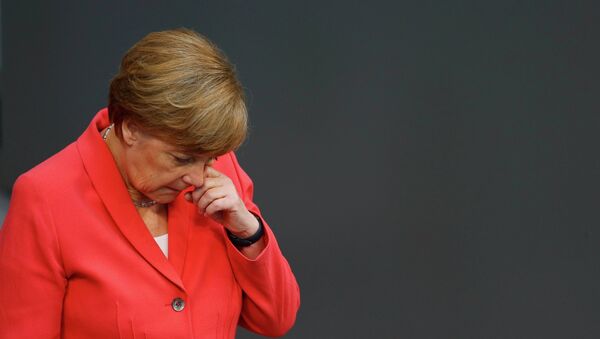Surely, there is no shared understanding of what constitutes a right or a wrong policy choice for the euro or the Eurozone economies, the journalist notes, citing the Grexit as a prime example of what he considers a right choice offered by Berlin. For those who disagree he calls it a logical one.
The logic of Greece leaving the Eurozone "comes from the combination of the International Monetary Fund's analysis of Greece's sovereign debt burden, which defines it as unsustainable without a big write-off, and the view presented by Eurozone countries big and small, rich and poor, which holds that forgiveness of debt by official creditors is incompatible with membership of the single currency," Emmott explained.
There absolutely no economic logic for Greeks to accept the terms of bailout3. #Grexit (in all its 'horriblesness') is a better option.
— Tuomas Malinen (@mtmalinen) 14 июля 2015
Berlin was strongly in favor of the option during the talks on Greece's future in the Eurozone held after the referendum. France and Italy were strongly against forcing Athens out of the monetary union, although, according to the journalist, they are yet to defend their stance on the second reason behind the Grexit.
How is it legal for Germany to dominate and colonise a sovereign state in 2015? History repeats itself, people.
— Pabz (@PKaotic) 13 июля 2015
Emmott also added that "simple logic and the arithmetic of debt will make a Grexit simply a matter of time." Yet Greece remains in the euro area and not for the lack of Germany's trying to change this. A failure to achieve something as important could hardly be considered ruling with an iron fist.
"Neither Chancellor Angela Merkel nor [Germany's finance minister Wolfgang] Schäuble can now think that Germany in any sense 'dominates' Europe," the journalist asserted in an article titled "Europe's confused attitude to German leadership."
When it comes to wrong choices championed by Germany, Emmott is convinced that the fiscal pact of 2012 underlying fiscal austerity is on top of the list.
The agreement "mandates a universally tight fiscal stance in the Eurozone, regardless of whether a country has an affordable level of public debt, regardless of the cost of borrowing and regardless of the state of aggregate demand, and which simultaneously rejects any idea that countries with large current-account surpluses bear any responsibility for adjustment," the journalist explained.
The pact, formally known as the Treaty on Stability, Coordination and Governance in the Economic and Monetary Union, has been ratified by all Eurozone members.
#EU meant to integrate #Germany into #Europe with #France to prevent another war, not for Germany to rule: #GreeceCrisis #GreeceSolidarity
— Foreign Confidential (@ForeignC) 19 июля 2015



